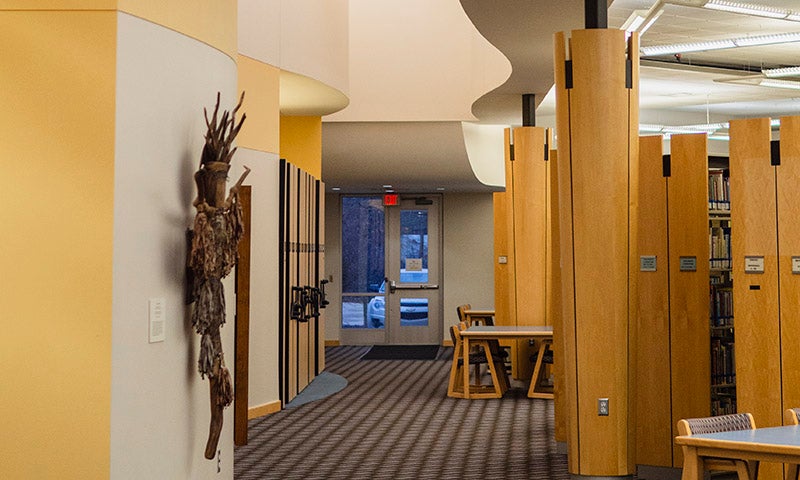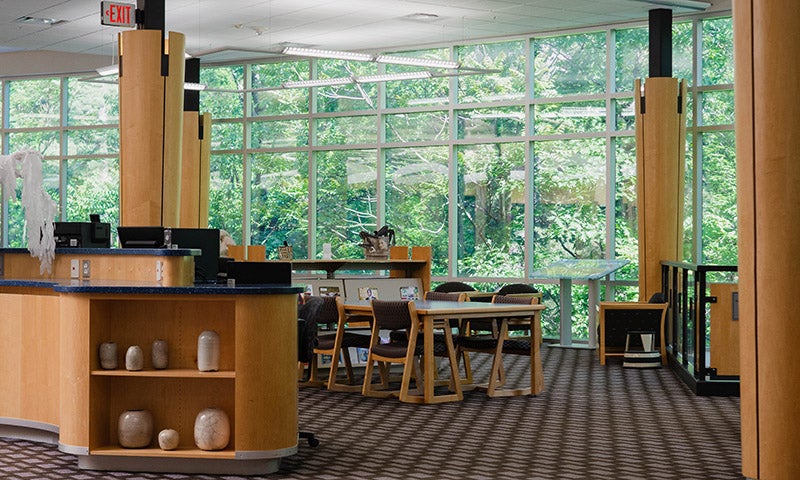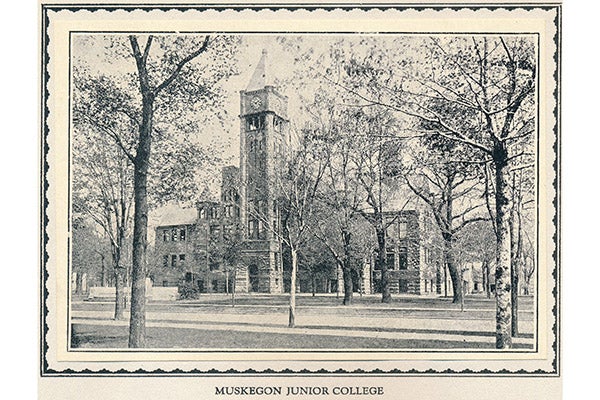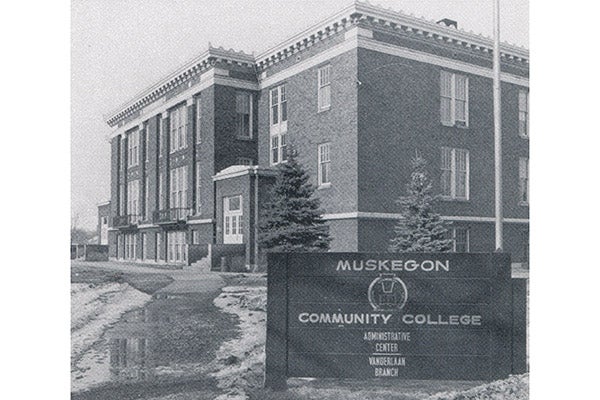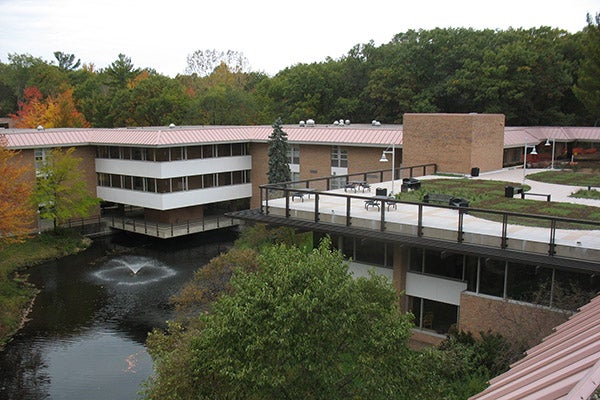Hendrik Meijer Library
Hendrik Meijer Library
Muskegon, MI 49442
Hours of Operation
M-Th
8:00 am - 8:00 pm
Fri
8:00 am - 12:00 pm
Weekends
Closed
Reference
Circulation/Public Services Desk
Archives
Campus Email:
Office Location
Main Campus
Library Mission Statement
The Hendrik Meijer Library of Muskegon Community College provides instructional materials and information services to support the curricula offered by the College and to meet the informational and research needs of students, faculty, staff and administration. The library extends these services to the community and serves as a catalyst in the lifelong learning process for the citizens of Muskegon County and the greater West Michigan area.
Services & Information
Currently enrolled MCC students, faculty and staff should use the MyMCC portal to access research databases. These databases can be accessed from anywhere using the links via MyMCC.
Campus guests and community members may use the databases on campus only. These are sorted by subject below:
General
- Academic Search Complete is a comprehensive scholarly, multi-disciplinary full-text database, with more than 8,500 full-text periodicals, including more than 7,300 peer-reviewed journals.
- FirstSearch provides access to a variety of articles in several OCLC databases as well as a catalog of books in libraries all over the world. Through FirstSearch, you can search a combination of different databases, including ArticleFirst, ERIC, Medline, SCIPIO, WorldCat, and WorldCat Dissertations.
- CQ Researcher plus Archive contains reports on controversial topics. Each report covers the history, current situation and contains bibliography of additional sources.
- Ebrary Academic Complete contains over 85,000 ebooks covering all academic subjects.
- Opposing Viewpoints in Context includes the viewpoints from the Opposing Viewpoints books in series as well as topic overviews, statistics, primary documents, links to websites, and full-text magazine and newspaper articles.
Arts & Humanities
- Art and Architecture Source has extensive coverage of research and development within the applied sciences and computing disciplines by combining high-quality databases from both EBSCO Publishing and H.W. Wilson.
- ARTStor (now part of JSTOR) is comprised of “a digital library of nearly one million images in the areas of art, architecture, the humanities, and social sciences with a set of tools to view, present, and manage images for research and pedagogical purposes.” The images may be used for educational purposes.
- Humanities Source is designed to meet the needs of students, researchers and educators interested in all aspects of the humanities. Coverage includes worldwide content pertaining to literary, scholarly and creative thought.
- Humanities Ebooks contains over 2,000 scholarly books dealing with ancient through 20th century time periods. Coverage of the Americas, Europe, Asia and Africa.
- JSTOR (Journal Storage Archive) covers a range of disciplines including: social sciences, ecology & evolutionary biology, education, business, language & literature, mathematics and philosophy.
- Oxford Reference Online contains several dictionaries and reference books. Areas covered include the humanities, social sciences, literature, politics, business, law, science and medicine.
Biographies
- African American Studies Center (Oxford) contains articles and reference books covering all aspects of African American history.
- American National Biography contains biographical information on more than 18,000 “people from all eras who have influenced and shaped American history and culture.”
- Oxford Dictionary of National Biography contains 56,000 biographies of “people who shaped the history of the British Isles and beyond, from the earliest times to the year 2004.”
Biology
- JSTOR contains journals beginning in the nineteenth century pertaining to biological sciences including: biodiversity, conservations, paleontology, plant science, cell biology, and zoology. No current articles (within the last three to five years) are included.
- Science Direct College Edition contains scholarly journals covering behavioral sciences, health, biology and nursing.
Business
- Entrepreneurial Studies Source provides the latest insight into topics relevant to entrepreneurship and small business.
- JSTOR (Journal Storage Archive) includes articles from scholarly journals. JSTOR serves as an archive for journals, consequently current years are not included.
Controversial Issues
- CQ Researcher plus Archive contains reports on controversial topics. Each report covers the history, current situation and contains bibliography of additional sources.
- Opposing Viewpoints in Context includes the viewpoints from the Opposing Viewpoints books in series as well as topic overviews, statistics, primary documents, links to websites, and full-text magazine and newspaper articles.
Current Events and News (including archived and local news sources)
- America’s Newspapers (formerly Newsbank) is a good source for local, state and national information. Contains several regional newspapers including The Muskegon Chronicle, the White Lake Beacon, the Grand Rapids Press, and Detroit News as well as many major newspapers including The New York Times and The Washington Post.
- US Major Dailies contains major daily newspapers including: Chicago Tribune, Los Angeles Times, New York Times, Wall Street Journal and the Washington Post.
Education
- Education Source coverage spans all levels of education from early childhood to higher education and also includes educational specialties such as multilingual education, health education and testing.
- FirstSearch contains the database ERIC (Educational Resources Information Center), an index to educational materials from the monthly Resources in Education (RIE) and to journal articles issued in the monthly Current Index to Journals in Education (CIJE).
- JSTOR (Journal Storage Archive) includes articles from scholarly journals. JSTOR serves as an archive for journals, consequently current years are not included.
History & Humanities
- African American Studies Center (Oxford) contains articles and reference books covering all aspects of African American history.
- American National Biography contains biographical information on more than 18,000 “people from all eras who have influenced and shaped American history and culture.”
- CQ Researcher plus Archive contains reports on controversial topics. Each report covers the history, current situation and contains bibliography of additional sources.
- Dictionary of National Biography contains 56,000 biographies of “people who shaped the history of the British Isles and beyond, from the earliest times to the year 2004”.
- HarpWeek database of Harper’s Weekly magazine from 1857 – 1889. A good source for information pertaining to the U. S. Civil War and other historic events.
- Humanities Ebooks contains over 2,000 full text, scholarly history books dealing with ancient through 20th century time periods. Coverage of the Americas, Europe, Asia, and Africa.
- JSTOR (Journal Storage Archive) includes articles from scholarly journals. JSTOR serves as an archive for journals, consequently current years are not included.
Language & Literature
- Poetry & Short Story Reference Center provides a collection of hundreds of thousands of classic and contemporary poems, as well as short stories, biographies, and authoritative essays on such topics as poetic forms, movements, and techniques—including contemporary content.
- JSTOR (Journal Storage Archive) includes articles from scholarly journals. JSTOR serves as an archive for journals, consequently current years are not included.
- Oxford English Dictionary
The Oxford English Dictionary is the authority on the history and development of the English language since 1150. The online version is an update to the 20 volume, 2nd edition.
Legal
- JSTOR (Journal Storage Archive) includes articles from scholarly journals. JSTOR serves as an archive for journals, consequently current years are not included.
- Legal Source provides full-text coverage of scholarly law journals.
- Oxford Reference Online contains dictionaries and reference books. Areas covered include the humanities, social sciences, literature, politics, business, law, science and medicine.
Mathematics
- JSTOR (Journal Storage Archive) includes articles from scholarly journals. JSTOR serves as an archive for journals, consequently current years are not included.
Medical, Nursing, Allied Health
- ALT HealthWatch provides in-depth coverage across the full spectrum of subject areas covered by complementary and alternative medicine.
- CINAHL Complete provides indexing for journals from the fields of nursing and allied health; the full text of over 1,300 journals is available.
- Health Source: Nursing/Academic Edition provides nearly 550 scholarly full text journals focusing on many medical disciplines. Also features the AHFS Consumer Medication Information, which covers 1,300 generic drug patient education sheets with more than 4,700 brand names.
- Oxford Medicine Online contains reference books covering medical topics.
- Psychiatry Online contains psychiatric journals, the DSM-5® and earlier editions of the DSM, handbooks, and comprehensive textbooks in the field of psychiatry.
Politics & Government
- CQ Researcher plus Archive contains reports on controversial topics. Each report covers the history, current situation and contains bibliography of additional sources.
- JSTOR (Journal Storage Archive) includes articles from scholarly journals. JSTOR serves as an archive for journals, consequently current years are not included.
- Oxford Reference Online contains dictionaries and reference books. Areas covered include the humanities, social sciences, literature, politics, business, law, science and medicine.
- Political Science Complete provides full text for more than 520 journals and indexing and abstracts for over 2,900 titles. The database also features over 340 full-text reference books and monographs, and over 36,000 full-text conference papers, including those of the International Political Science Association.
Psychology
- JSTOR (Journal Storage Archive) includes articles from scholarly journals. JSTOR serves as an archive for journals, consequently current years are not included.
- ProQuest Psychology Database includes journals and other publications covering psychology and related fields such as health, management, education and law.
- PsycARTICLES contains 50 journals covering general psychology and specialized basic, applied, clinical, and theoretical research.
- PsychiatryOnline contains psychiatric journals, the DSM-5, handbooks, and comprehensive textbooks in the field of psychiatry.
- Psychology and Behavioral Sciences Collection covers topics in emotional and behavioral characteristics, psychiatry & psychology, mental processes, anthropology, and observational & experimental methods.
- Science Direct College Edition contains the full text of major social science encyclopedias with emphasis on the behavioral sciences.
Science
- Applied Science & Technology Source coverage of research and development within the applied sciences and computing disciplines by combining high-quality databases from both EBSCO Publishing and H.W. Wilson.
- JSTOR (Journal Storage Archive) includes articles from scholarly journals. JSTOR serves as an archive for journals, consequently current years are not included.
- Science Direct College Edition contains scholarly journals covering behavioral sciences, health, biology and nursing.
Social Sciences
- African American Studies Center (Oxford) contains articles and reference books covering all aspects of African American history.
- Humanities Source includes worldwide content pertaining to literary, scholarly and creative thought.
- JSTOR (Journal Storage Archive) includes articles from scholarly journals. JSTOR serves as an archive for journals, consequently current years are not included.
- Oxford Reference Online contains dictionaries and reference books. Areas covered include the humanities, social sciences, literature, politics, business, law, science and medicine.
- Psychology and Behavioral Sciences Collection includes topics in emotional and behavioral characteristics, psychiatry & psychology, mental processes, anthropology, and observational & experimental methods.
- Science Direct College Edition contains the full text of major social science encyclopedias with emphasis on the behavioral sciences. Also contains scholarly journals from the social sciences.
Technology
- Applied Science & Technology Source extensive coverage of research and development within the applied sciences and computing disciplines by combining high-quality databases from both EBSCO Publishing and H.W. Wilson.
- O’Reilly for Education (formerly Safari Tech Books Online) contains full-text books, learning modules, and presentations covering computer-related topics including certification, graphics, hardware, Internet, IT management, markup languages, networking, operating systems, programming, security, software engineering and other topics.
The WorldCat Discovery tool allows patrons to search for materials our library has access to as well as materials other libraries will share via interlibrary loan. The tool does not link well to all databases, so if you are searching for articles, we highly recommend searching directly in the databases.
Periodicals
Looking for a journal, magazine, or newspaper title? Use the following link to search for any title, or any portion of a title to see if we have print copies and their retention schedules and/or if we have access to it and what years are available in any of the databases: Serials Solutions
Books in the Stacks
Search the library catalog to find print books, videos (VHS and DVD), and CDs using this link: Library Catalog
The main screen of the Catalog is the Quick Search page; for a comprehensive search use the Advanced Search.
To Do a Quick Search
Defaulted to search the whole catalog and all fields:
1. Type your key research term/word in search box
2. Click Search
To change the search field:
1. Click on the down arrow next to All Fields
2. Select the field you wish to use (author, title, subject, etc.)
3. Type your search term/word
4. Click Search
To search for materials/textbooks instructors have placed on reserve for students in their classes, use this link and follow the directions below: Instructor Reserves
- Change the search location from Everything to Reserves
- Select which search field – Course Name, Course ID or Instructor Name
- Course ID Format: MCC Course # (Example: MCC ENG 101)
- Instructor name must be spelled correctly
- Type your Course info or Instructor name
- Click Search
- Locate your class from Search Results
The Library has eight study rooms available for patrons to use. Reservations are not necessary but are strongly encouraged, especially during mid-day hours.
These can be reserved ahead of time by calling (231) 777-0270 or visiting the Public Services Desk. MCC students have priority for room use, but anyone is welcome.
See the policies and forms tab for more information.
The Muskegon Community College Archive is a collection of materials that preserves the College’s history and is housed in the Hendrik Meijer Library. The holdings are routinely expanded as history and documents are made on all campuses and items are saved for posterity.
The intention is to incorporate appropriate new materials into the Archive, preserve the existing materials, make them accessible for researchers, and maintain a level of preservation standard in keeping with the standards of the Society of American Archivists.
- To search our archive holdings, use this link: Archive Catalog.
- To inquire about items that are possibly not listed in the catalog and/or to donate items to the archive, contact the Archivist (call (231) 777-0493 or email archive@muskegoncc.edu).
- For archive policies, donation forms, use forms, etc., please see the Policies & Forms tab.
MCC History
1926–
Muskegon Junior College was established in 1926 by the Muskegon Board of Education. Originally housed on the third floor of then-new Muskegon Senior High School.
By 1934, the College and high school enrollment had grown beyond the building’s capacity. The Junior College moved into the former Hackley School in downtown Muskegon across from Hackley Park.
In the years after World War II, enrollment climbed quickly. The Muskegon Board of Education, which operated the College, utilized available space in many of its buildings and rented other community facilities when enrollment exceeded the capacities of those buildings.
1951–
In June 1951, after an enabling act by the Michigan Legislature, the name and educational scope of the College was changed. Muskegon Junior College was renamed Muskegon Community College to reflect the expanded nature of the College’s programs. Courses were added in retailing, vocations, technical fields, public health, and trades.
1960–
By the early 1960’s, enrollment had topped 2,000. The College was operating full-time at Hackley, Vanderlaan, and Wilson schools and part-time at eight other locations. The Board of Education formed a Special Citizens Committee to study the entire program and make recommendations. The Committee made several proposals: the College be separated from the public school system, a county-wide community college district be created, a board of trustees be elected to plan, build, and operate the school and a millage be voted in sufficient amount and for enough years to build and operate the College.
In April 1963, Muskegon County overwhelmingly approved the committee’s recommendations and elected the first Board of Trustees, which went to work immediately and by September had purchased the tract of land the College exists on.
Alden B. Dow and Associates was named architect and by the summer 1965, drawings were completed, and construction begun.
In the fall of 1966, the Vocational Technical Wing was completed and occupied. The following September the rest of the college was occupied. The formal dedication ceremony was held October 22, 1967.
The Frauenthal Fine Arts Center, which was completed in 1968, was the first addition to the campus. Named for A. Harold Frauenthal, the Muskegon industrialist whose gift had made the Center possible.
1995–
In January 1995, the Center for Higher Education was completed. It was to provide upper-level courses and programs offered by Ferris State, Grand Valley State, and Western Michigan universities. The 90,000 square foot facility, named in honor of former MCC President James L. Stevenson, is home to classrooms, a lecture hall, MCC-TV, Graphics and Printing.
2006–
In January 2006, the 40,000 square foot Hendrik Meijer Library Information Technology Center was added to offer the latest in communication capabilities, including wireless internet access, state-of-the-art library facilities/technologies and classrooms, and an internet café.
2013–
In November 2013, Muskegon voters approved $24 million to support four MCC facilities expansion projects outlined in the College’s 2010-2015 Master Plan.
2014–
In September 2014, MCC signed a purchase agreement to acquire the former Muskegon Chronicle building and an adjacent parking lot for the downtown campus. In December 2017, the Peter and Carolyn I. Sturrus Technology Center opened as the new home to MCC’s Applied Technology programs in CAD, Electronics/Automation, Engineering, Machining, Metal Casting, Materials, and Welding, as well as to MCC’s Experiential Learning Program.
2015–
In June 2015, local developer Jonathan Rooks donated the former Masonic Temple to MCC for its Entrepreneurial Studies program and related business-generating activities. Nick Sarnicola, a West Michigan native and highly successful entrepreneur, created a $200,000 permanent endowment through their Next Gen Foundation to the Foundation for Muskegon Community College to support an annual $10,000 cash award for the best business idea generated by an MCC entrepreneurial program graduate. The Rooks-Sarnicola Entrepreneur Institute opened in June 2018 and is home to the Lakeshore Fab Lab.
In August 2015, MCC opened its $9.6 million Science Center, home to the MCC Life Sciences Department and the College’s biology labs and research areas. The facility earned the Leadership in Energy and Environmental Design (LEED) Gold Certification – one of only four buildings in Muskegon – for its sustainable strategies used in its design and construction.
Also in 2015, MCC purchased the Muskegon Family YMCA’s West Western Avenue property on Muskegon Lake for $1.17 million as part of the college’s community-focused health and wellness initiative. The former YMCA facility was re-opened in 2016 as the MCC Lakeshore Fitness Center and closed in May 2020.
2018–
In November 2018, the 52,000 sq. ft. MCC Health and Wellness Center opened on the main campus. The facility houses the College’s Health, Physical Education and Recreation Department, the Medical Assistant Program and the Athletic Department. The building serves educational, fitness and medical purposes. The Center features a regulation wood floor gymnasium, a one-tenth mile indoor running track, a multipurpose room, and a fitness center. Meanwhile, a state-of-the-art Health Simulation Lab with learning spaces and classrooms serves the MCC Nursing and Respiratory Therapy programs. The Medical Assistant Program has classroom spaces. Also located in the building is the Mercy Health Partners Primary Care Center, a collaboration between MCC and its Mercy Health and Grand Valley State University educational partners, that serves the medical needs of the larger community.
2019–
In Fall 2019, the newly remodeled MCC Art and Music Building was re-occupied and the MCC Ottawa Center opened, continuing MCC’s four decades of offering classes in Grand Haven.
Hendrik Meijer Library follows all Muskegon Community College policies and procedures.
Archives
Access
Access to view archival materials will be available during the Library’s open hours or by appointment. Prior notice of at least four hours during normal working hours must be given so items can be prepared ahead of time. Access is provided by the Archivist to students and staff of the College and the community at large.
To help prepare the archivist, please fill out and email to archive@muskegoncc.edu the following form: Archive Research Request Form.
Limitation on Access
Access to materials may be restricted by condition of gift or deposit; because of their physical condition; or for other reasons.
- College records that are restricted based on FERPA or the college policy will be made available only to the office, department, or committee of origin and the Staff of the College Archives/Special Collections.
- Private donors who have imposed time frame restrictions will have access to their collection. Private donors will not be granted access to other collections that have restrictions.
- Unprocessed archival collections will be restricted from general research until they are inventoried and stabilized. The office, department, committee or donor may have access their donation as long as they do not remove any material.
Reproduction and Media Use Fee Schedule
Digital reproductions of select materials for personal/research use only are available to researchers for a fee. Researchers will pay the current College rate for black and white copies. Scans can be made of select materials and emailed directly to the researcher. Commercial, academic press, and other requests to reproduce media must go through owner(s) of the copyright(s). Please complete Letter of Agreement for Publication of Photographic & Digital Reproduction from the Archives/special collections/Special Collections.
Acquisition Policy
Acquisition and inclusion of new materials will be a focal point of the Archive, as well as the repository of artifacts & materials from its inception to present day.
If you have items you would like to donate please use the following form: Donation Form.
- The Archive seeks to acquire records as a loan pending copying of the records or as outright gifts. No records will be accepted without an Archive Donation/Loan Agreement. The Archive is not in a position to purchase archive material. (Complete Archival Donor or Transfer form)
- Wherever possible the Archive’s works to establish intellectual property rights, and in particular seeks to acquire the right to copy archival material for preservation and access purposes.
- Classified materials that pertain to the history of the College will be marked restricted and only available to patrons who have been granted permission by the administrative body under whose department the materials belonged in accordance to college policy and FERPA.
- Donors may restrict materials for a certain number of years (e.g. 25 years) and will only be available to the donor(s) or patrons who have received permission from the donor or their representative. It is up to the patron to contact the donor to acquire the permission.
- Where records are damaged and require extensive conservation and preservation resources, it may only be possible for the Archive to take them if funding is available to ensure their physical preservation.
- Materials acquired by the Archive will be retained and preserved in accordance with the Archive Donation/Loan Agreement. Those materials deemed unworthy of retention will be disposed of in accordance with the Agreement and/or the Deaccession Policy.
- Records which do not match this Policy may exceptionally be acquired if there is a clear relationship with the activity of the College. This may be done with the agreement of the Archivist/Assistant Archivist and the Library Coordinator.
Deaccession Policy
- The Archivist/Assistant Archivist will make a list of all items to be deaccessioned and will inform the Library Coordinator/Director of said list prior to deaccession. The following information must accompany each item listed:
- Brief description of each item
- Name of donor/co-owner, if known
- Proposed means of disposition
- Reasons for suggested disposition.
- Guidelines for deaccessioning items will be as follows:
- Items that do not fit within the defined mission of the Archive/Special Collections.
- Unnecessary duplicates – more than are required for exhibit or study.
- Items that have been deteriorated to the point that they are useless for exhibit or study and would not be cost-effective to restore.
- Items in fragmentary condition, impossible and excessively expensive to restore.
- Items approved for disposal will be disposed of as follows:
- Returned to donor and/or department if indicated to do so on the donation form.
- Donation to co-author or co-publisher if able to locate.
- Donation to students or staff at Muskegon Community College.
- Alternative repositories will be identified and contacted to acquire if record transfer would be possible for said records.
- Destruction, if necessary.
- Reasonable efforts will be made to limit the potential negative impact to researchers of the loss of information.
- All pertinent data on each object donated or destroyed must be recorded and information regarding the transaction must be kept and recorded by the Archivist/Assistant Archivist.
- All marks identifying any object with the Archive and/or Muskegon Community College must be removed.
Computer Usage
Hendrik Meijer Library has computers for students and community patrons to utilize for work, research, email, printing, etc. All computer users must adhere to MCC’s Technology Usage Policies.
Please remember that the MCC computers are primarily for academic use. Those not doing academic research and assignments may be asked to give up their computer for a student having legitimate academic and research needs.
Guest Passes
Guest passes are needed to use the computers and access the Wi-Fi network. They are issued at the Circulation desk (located to the left as you enter the library). To receive a guest pass, visitors must show a valid form of ID (Driver’s License, Passport, State ID) or apply for and receive a library card.
During heavy usage periods such as term paper rush, midterm and final exams, library computers may be reserved for student use only.
Study Rooms
- Any MCC patrons may use the rooms for studying if rooms are available.
- MCC students are given first priority and non-students may be asked to come back later to use the room if there are students waiting.
- The patron checking out the room (only one person per party if there are more than one in the room) must present one of the following valid IDs:
- MyMCC ID,
- Nursing ID,
- or photo ID.
- MCC students without an ID can also show their class schedule to check out a study room.
- Rooms may be reserved by phone or in person up to one month in advance.
- Rooms may be reserved for up to three hours at a time during peak times.
- Room eight is available for 1.5 hours during peak busy hours.
- Reservations will be cancelled if users do not arrive within 15 minutes of scheduled reservation time if others are waiting to use the room.
- Users will be asked to vacate a room when their reserved time expires if other students are waiting.
- Lights must be on when rooms are occupied unless academic or reserve videos are being viewed.
- The door should remain closed when rooms are occupied. These are kept locked to keep items safe if a patron must step out for a moment.
- All MCC college-wide policies apply to room use.
- Library staff will monitor rooms.


